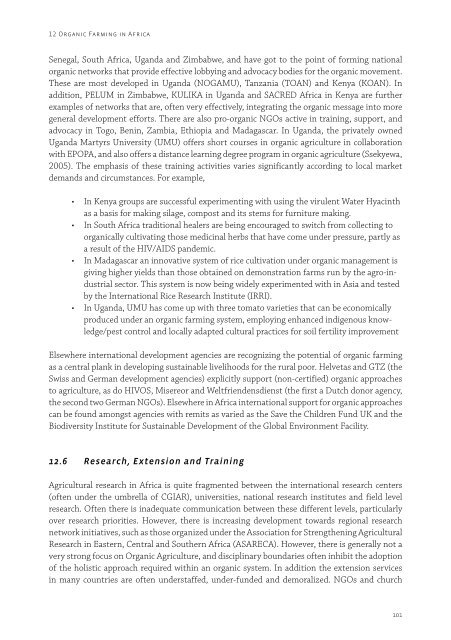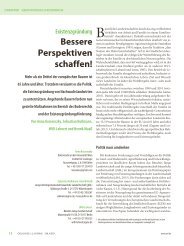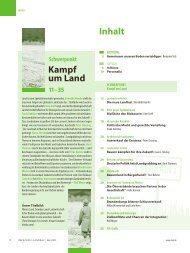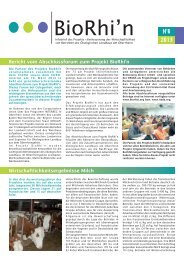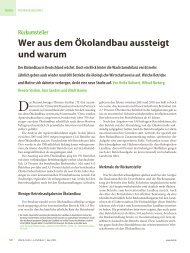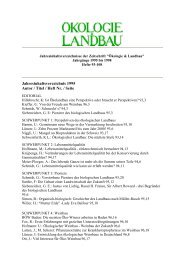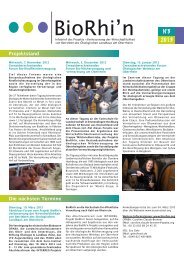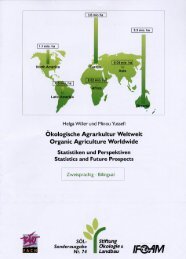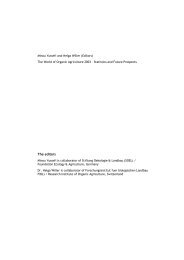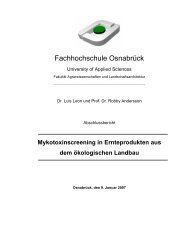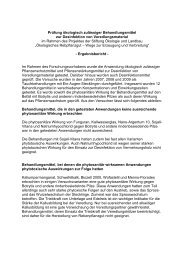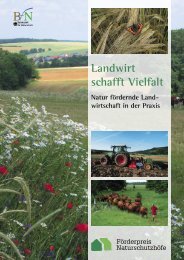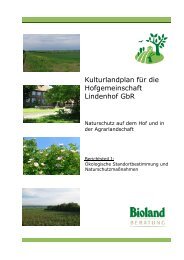the world of organic agriculture - Organic Eprints
the world of organic agriculture - Organic Eprints
the world of organic agriculture - Organic Eprints
You also want an ePaper? Increase the reach of your titles
YUMPU automatically turns print PDFs into web optimized ePapers that Google loves.
12 <strong>Organic</strong> Farming in Africa<br />
Senegal, South Africa, Uganda and Zimbabwe, and have got to <strong>the</strong> point <strong>of</strong> forming national<br />
<strong>organic</strong> networks that provide effective lobbying and advocacy bodies for <strong>the</strong> <strong>organic</strong> movement.<br />
These are most developed in Uganda (NOGAMU), Tanzania (TOAN) and Kenya (KOAN). In<br />
addition, PELUM in Zimbabwe, KULIKA in Uganda and SACRED Africa in Kenya are fur<strong>the</strong>r<br />
examples <strong>of</strong> networks that are, <strong>of</strong>ten very effectively, integrating <strong>the</strong> <strong>organic</strong> message into more<br />
general development efforts. There are also pro-<strong>organic</strong> NGOs active in training, support, and<br />
advocacy in Togo, Benin, Zambia, Ethiopia and Madagascar. In Uganda, <strong>the</strong> privately owned<br />
Uganda Martyrs University (UMU) <strong>of</strong>fers short courses in <strong>organic</strong> <strong>agriculture</strong> in collaboration<br />
with EPOPA, and also <strong>of</strong>fers a distance learning degree program in <strong>organic</strong> <strong>agriculture</strong> (Ssekyewa,<br />
2005). The emphasis <strong>of</strong> <strong>the</strong>se training activities varies significantly according to local market<br />
demands and circumstances. For example,<br />
• In Kenya groups are successful experimenting with using <strong>the</strong> virulent Water Hyacinth<br />
as a basis for making silage, compost and its stems for furniture making.<br />
• In South Africa traditional healers are being encouraged to switch from collecting to<br />
<strong>organic</strong>ally cultivating those medicinal herbs that have come under pressure, partly as<br />
a result <strong>of</strong> <strong>the</strong> HIV/AIDS pandemic.<br />
• In Madagascar an innovative system <strong>of</strong> rice cultivation under <strong>organic</strong> management is<br />
giving higher yields than those obtained on demonstration farms run by <strong>the</strong> agro-industrial<br />
sector. This system is now being widely experimented with in Asia and tested<br />
by <strong>the</strong> International Rice Research Institute (IRRI).<br />
• In Uganda, UMU has come up with three tomato varieties that can be economically<br />
produced under an <strong>organic</strong> farming system, employing enhanced indigenous knowledge/pest<br />
control and locally adapted cultural practices for soil fertility improvement<br />
Elsewhere international development agencies are recognizing <strong>the</strong> potential <strong>of</strong> <strong>organic</strong> farming<br />
as a central plank in developing sustainable livelihoods for <strong>the</strong> rural poor. Helvetas and GTZ (<strong>the</strong><br />
Swiss and German development agencies) explicitly support (non-certified) <strong>organic</strong> approaches<br />
to <strong>agriculture</strong>, as do HIVOS, Misereor and Weltfriendensdienst (<strong>the</strong> first a Dutch donor agency,<br />
<strong>the</strong> second two German NGOs). Elsewhere in Africa international support for <strong>organic</strong> approaches<br />
can be found amongst agencies with remits as varied as <strong>the</strong> Save <strong>the</strong> Children Fund UK and <strong>the</strong><br />
Biodiversity Institute for Sustainable Development <strong>of</strong> <strong>the</strong> Global Environment Facility.<br />
12.6 Research, Extension and Training<br />
Agricultural research in Africa is quite fragmented between <strong>the</strong> international research centers<br />
(<strong>of</strong>ten under <strong>the</strong> umbrella <strong>of</strong> CGIAR), universities, national research institutes and field level<br />
research. Often <strong>the</strong>re is inadequate communication between <strong>the</strong>se different levels, particularly<br />
over research priorities. However, <strong>the</strong>re is increasing development towards regional research<br />
network initiatives, such as those organized under <strong>the</strong> Association for Streng<strong>the</strong>ning Agricultural<br />
Research in Eastern, Central and Sou<strong>the</strong>rn Africa (ASARECA). However, <strong>the</strong>re is generally not a<br />
very strong focus on <strong>Organic</strong> Agriculture, and disciplinary boundaries <strong>of</strong>ten inhibit <strong>the</strong> adoption<br />
<strong>of</strong> <strong>the</strong> holistic approach required within an <strong>organic</strong> system. In addition <strong>the</strong> extension services<br />
in many countries are <strong>of</strong>ten understaffed, under-funded and demoralized. NGOs and church<br />
101


